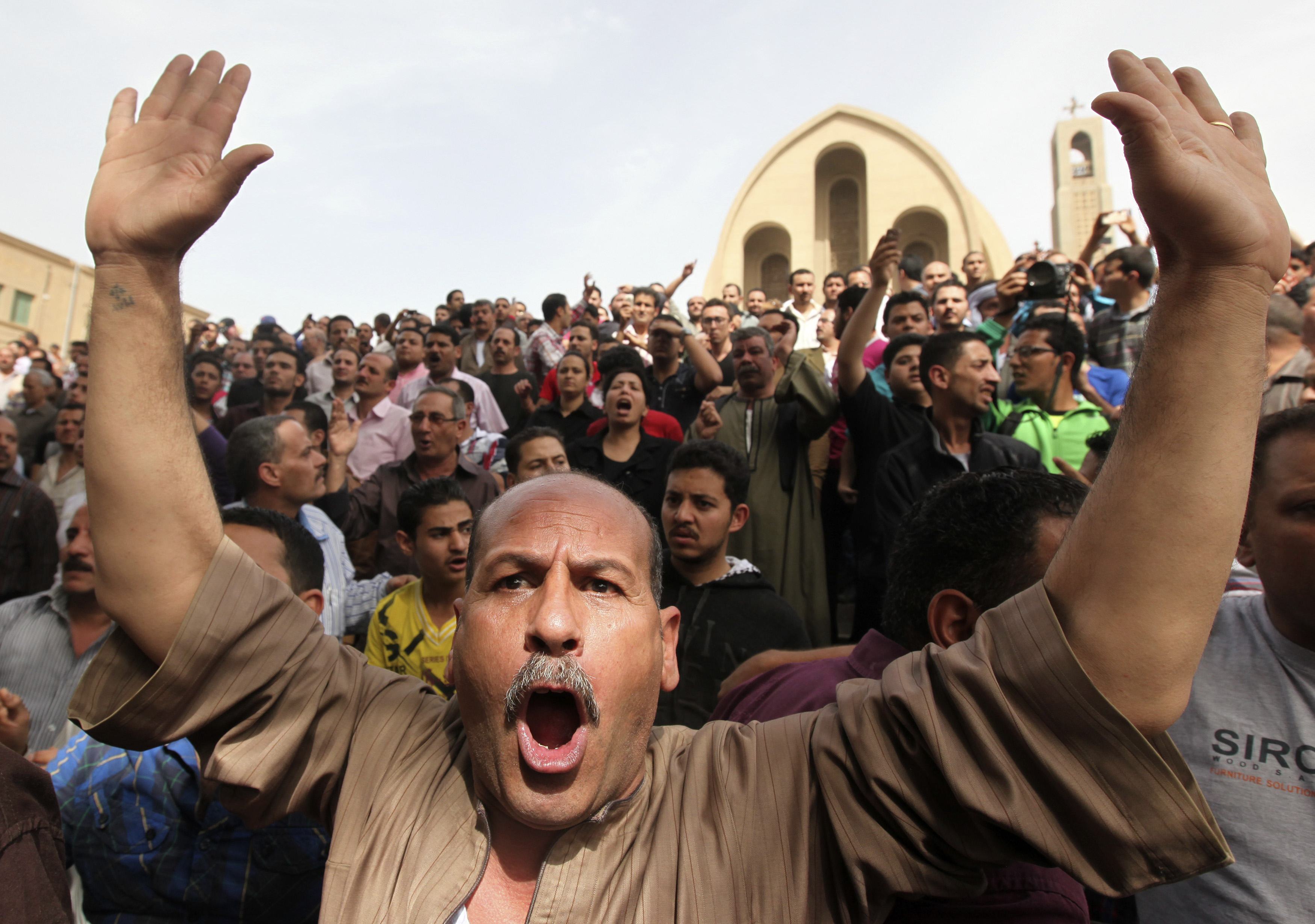Latest NEWS
- Aswat Masriya, the last word
- Roundup of Egypt's press headlines on March 15, 2017
- Roundup of Egypt's press headlines on March 14, 2017
- Former Egyptian President Hosni Mubarak to be released: lawyer
- Roundup of Egypt's press headlines on March 13, 2017
- Egypt's capital set to grow by half a million in 2017
- Egypt's wheat reserves to double with start of harvest -supply min
- Roundup of Egypt's press headlines on March 12, 2017
Second person dies from Egypt cathedral clashes

Coptic Orthodox Christians chant anti-Mursi and anti-government slogans as they attend the funeral of men who died during clashes between Muslims and Christians in El Khusus, El-Kalubia governorate, outside the main cathedral in Cairo April 7, 2013. REUTERS/Mohamed Abd El Ghany
By Paul Taylor
CAIRO, April 8 (Reuters) - A second Egyptian died on Monday of wounds sustained in clashes at Cairo's Coptic cathedral the previous day in an outbreak of sectarian violence that the government and Muslim and Christian leaders sought to calm.
A security source said a 21-year-old Muslim man, named only as Mohamed, died of a fractured skull in hospital after fighting between local Muslims and Copts who had been attending a funeral for four Christians shot dead in a town near Cairo on Friday.
The health ministry said at least 90 people, including 11 policemen, were wounded around the cathedral in one of the worst sectarian flare-ups since the fall of autocratic President Hosni Mubarak in 2011.
Prime Minister Hisham Kandil said the government was taking all measures to protect the safety of Egyptians of all faiths, promising to bring to justice the perpetrators of sectarian attacks and to crack down on unlicenced weapons.
He also spoke to the heads of the Coptic church and of the Islamic al-Azhar institution to discuss ways to resolve the crisis and prevent any repetition, a cabinet statement said.
The violence erupted as Egypt negotiates with a visiting International Monetary Fund delegation for a loan of at least $4.8 billion to ease a deepening economic crisis aggravated by political and sectarian turmoil that has hit investment and tourism in the Middle East's most populous nation.
Muslim and Christian religious leaders appeared together on late-night television to call for calm and national unity after the clashes around St. Mark's Cathedral, headquarters of the Coptic church, which raged for several hours on Sunday.
Muslims pelted Christians sheltering in the church compound with petrol bombs and rocks after angry young Copts leaving the funeral service chanted slogans against President Mohamed Mursi and his Muslim Brotherhood movement.
Witnesses accused the police of standing by as the Copts were attacked and of firing teargas at mourners in the compound as they emerged from the cathedral under a hail of rocks.
But a statement posted on the Interior Ministry's website on Sunday evening blamed Christians for starting the violence by vandalising several cars.
"As the procession passed Ramses Street, some of the mourners destroyed a number of cars which led to clashes and tensions with the area's residents and (we) are currently intervening to separate the groups," it said.
FAILURE TO PROTECT?
Mursi telephoned Coptic Orthodox Pope Tawadros II on Sunday evening to condemn the violence, telling him that "any attack on the cathedral is like an attack on me personally", the state news agency MENA reported.
Mursi ordered an investigation and sent his interior minister to the scene.
Christians make up about 10 percent of Egypt's 84 million people and have complained that the authorities have failed to protect them since Mubarak's overthrow, giving radical Islamists a free hand.
No senior government official attended the enthronement of the new pope last year, nor his predecessor's funeral.
Samir Morcos, who was the only Christian presidential aide until he resigned in November, told Reuters : "I cannot accept an attack on the cathedral, the symbol of the Coptic church. This has never happened before."
Debris-strewn streets around the cathedral were quiet on Monday morning with riot police blocking access. The wreckage of at least two burned-out cars and a carpet of bricks and stones littered the street that had been the main battlefield until late Sunday evening.
The Muslim Brotherhood's spiritual leader, Mohamed Badie, said in a statement on the movement's website that the attack on Christians in the town of El Khusus was alien to all Egyptians.
He blamed the violence not on Muslim radicals but on unnamed forces seeking to divide Egypt.
"Evidently, there are desperate attempts to subvert our national unity. They will not succeed, God willing," Badie said. (Additional reporting by Asma Alsharif and Ulf Laessing; Editing by Alistair Lyon)










